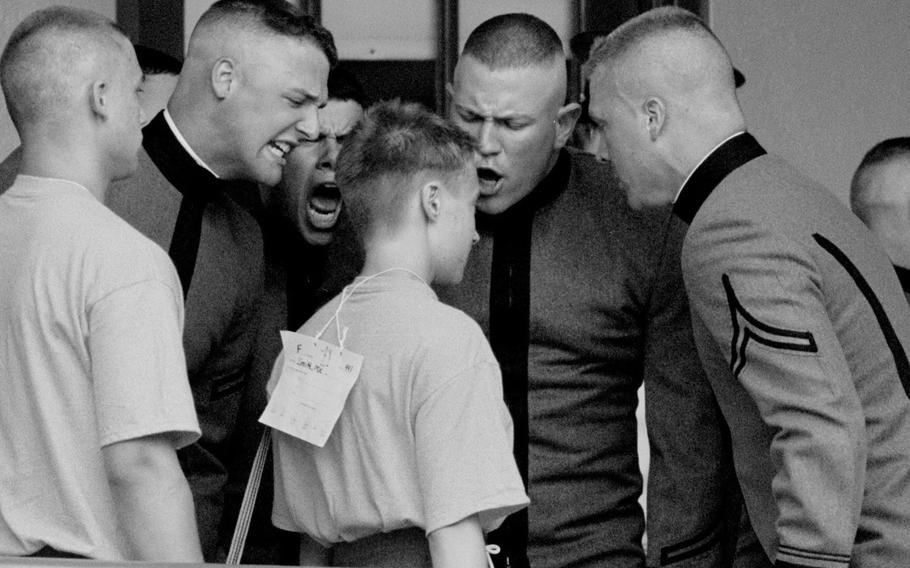
Megan Smith gets castigated by male upperclassmen in August 1997 as women participate for the first time in the start of VMI’s infamous “rat line.” (Nancy Andrews/Washington Post)
The former Virginia Military Institute cadet was scrolling Facebook when he saw a trio of photos that made him seethe.
The images showed a graduating VMI student being sworn in as a Marine officer on a December day in 2019 at the school’s historic Memorial Hall.
The former cadet knew the freshly commissioned Marine second lieutenant in a way he’d never forget. Just across the street from Memorial Hall, that same student had helped waterboard him and another VMI freshman inside the barracks as part of an unauthorized initiation ritual, according to two lawsuits, a VMI police report and the transcript of a VMI disciplinary hearing.
One VMI official testified that the January 2018 incident, though brief, was one of the worst episodes of abuse against a freshman he could remember at the nation’s oldest state-supported military college, where hazing is prohibited by state law and VMI policy.
The room had been darkened, the feet of the two freshmen were bound with duct tape, and an Islamic call to prayer was played on a speaker to invoke the Abu Ghraib prison torture scandal, the police report and the VMI disciplinary hearing transcript show.
Waterboarding is designed to simulate the feeling of being drowned and became the subject of heated debate when the CIA used it to interrogate al-Qaida detainees after the Sept. 11, 2001, terrorist attacks.
Why, the former cadet wondered, did VMI suspend his tormentor and two other upperclassmen instead of expelling them, allowing them to return to school and graduate? And why was the military commissioning any of them as officers, including two cadets who were in the room and did nothing to stop it?
The Facebook photos made the former cadet so irate that he decided to sue.
He filed a federal lawsuit under the name “John Doe” against the college, its senior administrators and five of the cadets in the room. When his case was dismissed in 2020, he immediately filed another suit against the five students in state court, seeking nearly $1 million in damages and legal fees.
“VMI was the life I was trying to build, and those students took it away from me,” he said. “I was shocked that the upperclassmen in that room that night were allowed to commission. Who would let them in? This was a war crime - but for fun.”
But Will Woodrow, the defense attorney for one of the suspended students, said the term waterboarding unfairly exaggerates what happened.
“Their heads weren’t held in place, and water wasn’t constantly being poured down their mouths, so they felt like they were drowning,” Woodrow said. “This was a few ounces of water. They could have sat up and said, ‘Stop.’ Waterboarding is a very loaded word. We learned about it because of what the CIA did. But that’s not what these cadets were doing.”
VMI officials were not in doubt about what happened.
“It was pretty clear to me,” Bill Wanovich, the school’s then-commandant, testified at a disciplinary hearing, “that both of [the freshmen] had been waterboarded at least once.”
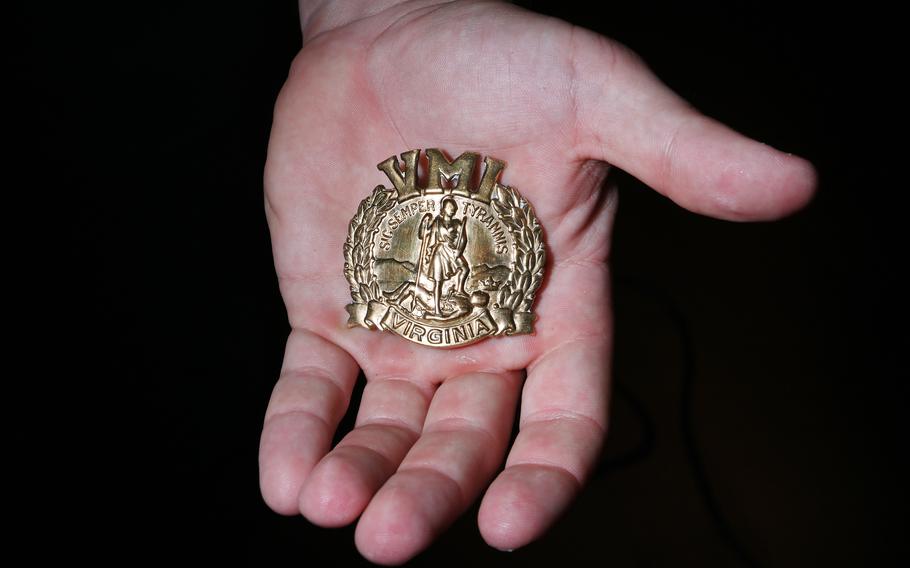
Robert holds a VMI hat insignia. (Matt McClain/Washington Post)
Hazing lawsuits
For more than a year, the hazing lawsuits have been overshadowed by the state-ordered investigation into racism and sexism at VMI.
The 182-year-old college, which received $21.6 million in state funding for the 2021-22 academic year, educates about 1,650 students on its Lexington campus.
But with the independent investigation complete and a series of reforms underway, the lawsuit against the five VMI graduates in Roanoke County Circuit Court highlights another controversial component of the college’s culture: its century-plus-old “rat line.”
At VMI, new students, known as “rats,” are subjected to a roughly six-month initiation process, enduring grueling boot-camp-style workouts and verbal abuse from upperclassmen.
But VMI warns its cadets, coaches and teachers that the school does not tolerate hazing, which can pose a threat to student safety. “Any individual or organization found to be in violation of this policy shall be subject to disciplinary action, which may include a sanction up to and including dismissal for cadets and termination of employment for faculty, administrators, coaches, and staff,” VMI’s policy states.
The school routinely expels students who violate its one-strike-and-you’re-out honor code, barring cadets from lying, cheating, stealing or tolerating those who do.
In a statement to The Washington Post, a VMI spokesman declined to explain why the students involved in the waterboarding incident were not expelled, saying federal law prohibits the school from discussing specific cadet disciplinary cases.
“Hazing has been and continues to be a dismissible offense and a crime,” the college said. “Reports of incidents that could constitute hazing are always reported to the Commonwealth Attorney and investigated by law enforcement. If a cadet is found guilty by a court of law, they will be permanently dismissed from the Institute. . . . If the matter does not rise to a criminal charge but is considered conduct unbecoming of a cadet, the matter will be adjudicated by the commandant and/or the superintendent, up to, and including, expulsion from VMI.”
The waterboarding incident occurred during a “rat mission,” an unsanctioned task, ranging from the silly to the extreme, that freshmen complete at an upperclassman’s order.
The Post is identifying the former cadet who filed the lawsuits by his middle name, Robert, because his anonymity as a plaintiff has so far not been denied in court.
The Post is also not identifying the defendants because, though the police investigated the incident, they were not charged with crimes, and Robert, now 23, did not press charges himself. The Post is, however, naming the other freshman who was targeted, Jacob Salomonsky.
Shortly before he graduated in 2021, Salomonsky filed a motion in Robert’s lawsuit seeking a court order for Robert to stop calling him “John Doe 2” and asserting that he does not need anonymity. Salomonsky - who did not respond to interview requests from The Post - also wanted Robert to remove any claims suggesting the defendants committed legal wrongdoing against him.
He said “the events of that evening consisted of good-natured roughhousing and some silly charades delivered with a playful spirit.” His and Robert’s identities are well known in the VMI community, he said, so being cast as a victim harmed his “personal and professional” interests and associated him with “an unfounded attack on what will be my alma mater - VMI.”
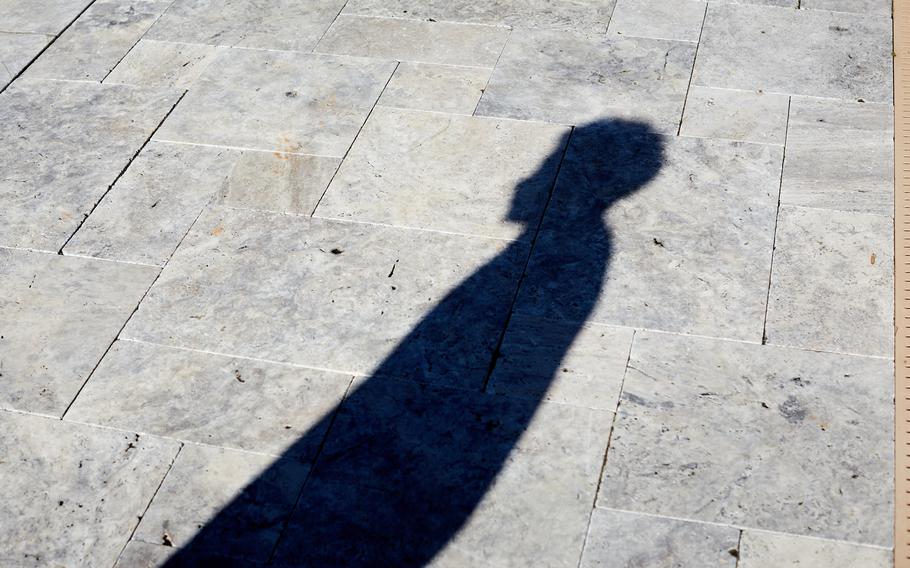
The shadow of Rafael Jenkins, who was threatened with a lynching by a White student during Hell week in 2018. (Logan Cyrus/For The Washington Post)
History of hazing
For years, universities and military academies - from the Air Force Academy in Colorado to the Citadel in South Carolina - have grappled with hazing incidents that have resulted in serious injuries or even death. In September, multiple students at Virginia Commonwealth University were charged with hazing after a freshman died of alcohol poisoning at a fraternity party.
VMI’s history of hazing goes back decades. Its most distinguished alumnus, Gen. George Marshall - whose statue stands outside the barracks - is perhaps the college’s most renowned hazing victim. The future statesman, who graduated from VMI in 1901, was forced as a rat to squat over an upturned bayonet, but slipped and tore his buttock, “narrowly missing serious injury,” according to the George C. Marshall Foundation.
A century later, in 1997, six VMI freshmen were beaten with a belt - and once with a coat hanger - on their legs and buttocks by seniors about three times a week for one month. More recently, in 2005, photos of at least one VMI cadet bound in duct tape leaked to a Richmond online news site in a ritual called “balling up.”
In his now-dismissed federal lawsuit, Robert listed multiple hazing incidents against freshmen that transpired during his freshman year or shortly before he arrived in August 2017: a cadet tied to a chair and beaten with socks full of bars of soap; a student ordered to defecate in an another cadet’s container of protein supplement; cadets directed to work out in an upperclassman’s barracks room while chewing tobacco or with a mouth full of water.
Virginia’s attorney general, which represented VMI and its administrators in the federal lawsuit, said in court documents those anecdotes “amount to rumors” because Robert did not say when or where they may have occurred or if the college knew about them.
But one cadet testified during a disciplinary hearing related to the waterboarding case that his upper-class mentor had burned his chest with a cigar.
In interviews with The Post, several current and former VMI students said the rat line can create the conditions that lead to hazing or other forms of mistreatment.
In 2018, seven months after the waterboarding incident, a Black freshman named Rafael Jenkins was threatened with a lynching by a White sophomore during what’s known as Hell Week. The student was suspended and left VMI.
According to the state-ordered investigation into VMI, five of 12 Black cadets surveyed found the rat line promotes “racial intolerance and/or discrimination” either “a little” or “a lot.”
But the investigation did not recommend any changes to the rat line or most of VMI’s other traditions, beyond urging the school to “examine how it can create an environment that does not disadvantage or impose disparate effects on minorities.” The two freshmen in the waterboarding case are White.
In its Blue Book of cadet regulations, VMI prohibits treating rats cruelly, including striking them “with or without an implement,” requiring them to binge eat or drink, or targeting them with “unduly harsh” or “abusive” language. Its cadet handbook issues another edict: “Rats cannot choose to be hazed.” Both manuals outline how hazing is illegal in Virginia.
VMI said in its statement to The Post that it “has protocols in place to quickly identify and resolve any alleged act of hazing. Cadets who are in leadership positions are given clear rules of engagement and provided with training on what constitutes hazing.” Freshmen are also educated “on what is appropriate and not appropriate conduct within the confines of the rat line.”
At a school where students and alumni often refer to one another as “brother rats,” VMI has always taken pride in the rat line’s adversity.
Though VMI doesn’t require any of its students to commission in the military, every freshman must endure the rat line. The college bills it as the “great equalizer” because “all rats equally have to earn the respect” of the student body through their “effort, grit, and determination” regardless of their backgrounds.
Older, handpicked cadets - known as cadre members - frequently shout commands at rats in the barracks, telling them to drop and do push-ups if their rooms are messy, if their uniforms aren’t worn properly, or if they laugh or act disrespectfully. The freshmen are often ordered to “strain” - tuck their chins into their chest and bend their backs backward, sometimes so severely that their bodies can shake.
“Bracing,” a similar kind of stance, is still a requirement at VMI’s rival, the Citadel, but the Naval Academy and West Point have phased out those painful postures, according to the schools’ spokespeople.
Cadets told The Post that some harsh aspects of VMI’s rat line may not generate headlines like beatings or waterboarding. But they question the purpose of straining or being forced to stand on their toes in their stiff military shoes during formations.
Straining “hurts your back,” said one freshman, who spoke anonymously for fear of reprisal. “They’ll just say, ‘Push your forehead back’ over and over. You bend so far back, and they make you hold it. It’s extremely painful.”
In August, VMI allowed Business Insider to film Hell Week, the first days rats spend on campus. The video, published in November, shows freshmen being screamed at, forced to strain or do workouts while chanting the school’s honor code.
But VMI police records show only three investigations into hazing in the past five years, including the waterboarding case. And according to the college’s statistics, the number of incidents in which cadre members failed to meet VMI’s “standards of conduct” during Hell Week has been dropping, from 148 in 2019 to 84 in 2020 to 75 in 2021.
The college’s 2020 Hell Week report recounts one upper-class student warning a rat, “I’ll make this so bad for you that . . . you won’t want to wake up in the morning” and threatening to kick another rat down the stairs. Other older cadets lunged at rats, calling them “retard” or “pussy” and spewing expletives, according to the report.
A classification of Hell Week incidents includes a “Rat Emotional Breakdowns” category. In one report, there were 18 recorded in 2019, five in 2020 and zero in 2021.
In 2020, one 18-year-old endured relentless verbal abuse from cadre members, the Hell Week report from that year shows. In an interview with The Post, he said the rat line left him so alienated and depressed that he tried to hang himself twice in one night with his VMI-issued belt in a barracks shower. After he told his roommates about his suicide attempts, he was escorted to the campus hospital and soon left VMI.
The former cadet, who wanted to join the Navy as a nuclear engineer, said the rat line operates under “the guise of tradition to facilitate the perpetual cycle of revenge and abuse.”
Asked about the suicide attempt, VMI said it has “trained counselors and medical professionals on staff 24-hours per day to help any cadet struggling with anxiety, depression, suicidal thoughts, and other mental health issues.”
This year, a rat had to seek medical treatment for panic attacks and suicidal thoughts before withdrawing from the school, said one VMI student, who knew the cadet.
“The rat was planning to commission, but found the rat line - and all the yelling - overwhelming and all too much,” said the cadet, who spoke on the condition of anonymity for fear of retaliation.
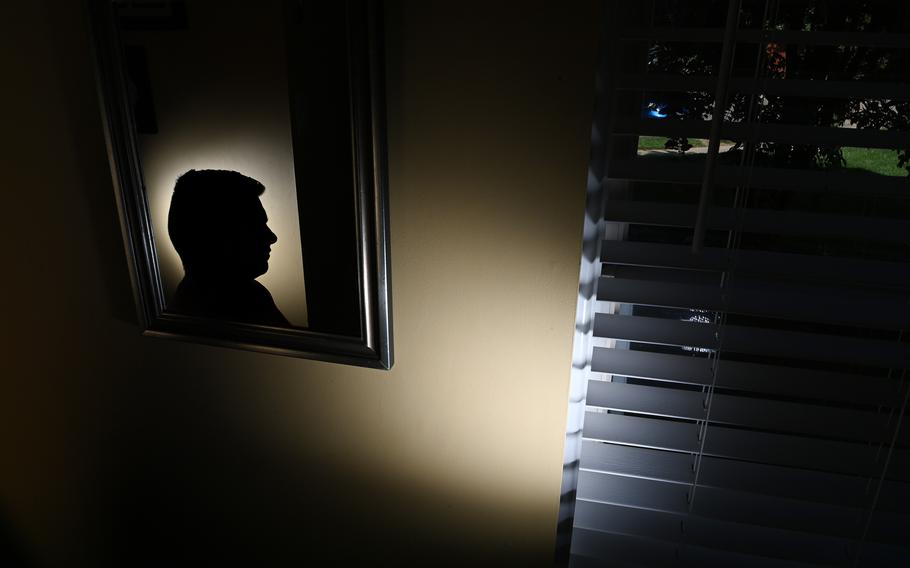
A former Virginia Military Institute student has filed a lawsuit under the name “John Doe” over his treatment there. (Matt McClain/Washington Post)
‘Part of the rat line’
For a long time, Robert downplayed his experience being waterboarded. After all, it had lasted just seconds.
“I thought it was normal,” he said. “This was just part of the rat line.”
It was around 1 a.m. on Jan. 31, 2018, when Robert entered an upperclassmen’s barracks room to help another freshman, Jacob Salomonsky, with a rat mission. The night’s objective: retrieve Salomonsky’s mattress, which had been stolen at the direction of an upperclassman.
It was “Resurrection Week.” The freshman class was days away from “Breakout,” a day-long event filled with intense physical workouts and a march carrying logs.
Once they broke out, they would no longer be rats. They’d finally earn their status as “fourth-class” cadets.
But inside the upperclassmen’s darkened room, Robert could barely see anything or make out where Salomonsky was.
Suddenly, a junior put Robert in a headlock, according to the VMI police report. Then, someone fastened a mattress strap around his upper body, pinning his arms to his side, the report said. His feet were duct-taped together, and he was pushed under a bed frame.
“It’s time for some Abu Ghraib shit,” the junior declared, according to Robert. He began playing the Islamic call to prayer on a speaker, the police report said.
Salomonsky was summoned to the front of the room. Robert couldn’t see what was going on, but two juniors hovered over his classmate. One of the juniors placed a towel over his face, while the other junior “dripped water into his mouth,” the VMI police report said. It lasted about five seconds. When he coughed, the rag was removed.
“Yum,” said Salomonsky, who laughed about it.
“I wasn’t like choking on air or water . . . it was kind of awkward to have water go down my throat when I’m lying on my back,” Salomonsky would later testify at a disciplinary hearing. “But I was never gasping for air.”
Next up was Robert. He’d shaken the mattress strap loose and his hands were free, he testified at the hearing. But his feet were still duct-taped.
The junior who played the Islamic music placed a towel over his face and a second junior pushed it partially in his mouth. Then, he told The Post, one or both of them poured water over his face two different times.
On the first try, Robert was able to drink the water through the cloth and didn’t choke, he testified in the disciplinary hearing. The second time, the rag was pulled taut over his mouth, he told the Post, and when the water was poured over the cloth, he struggled to breathe for a few seconds.
“As soon as [Robert] gasped for air, the towel was removed,” the police report said.
The two freshmen were then ordered to wrestle shirtless, then they were duct-taped together back-to-back and told to leave, according to the police report.
Once he was back in his own bed, Robert said he felt relieved. That changed when he described what had happened to his upper-class mentors.
One of them reported the incident, triggering a criminal investigation by VMI police and consternation among college officials.
Robert’s father, an active-duty Air Force colonel who works as a senior administrator for a defense and intelligence agency, was outraged. He called his son and told him he wanted him to leave VMI. But Robert refused.
Breakout - the end of the rat line - was just around the corner.
“I told him: ‘Dude, I think you’re broken. I think you have Stockholm syndrome,’ “ the father said in an interview.
When he was interviewed by a VMI police officer, one of the juniors who conducted the waterboarding claimed the freshmen were “enjoying themselves” that night. The report also alleged Robert laughed after being waterboarded and said, “Do it again” - claims Robert disputes.
“I didn’t laugh like I was enjoying it. I might have chuckled nervously. I was scared,” Robert told The Post. He didn’t know what would follow. “I thought there was a potential for them to violate me.”
The officer concluded the night’s activities met the state code’s definition of hazing, but not the criminal code’s requirements for hazing charges since Robert and Salomonsky were not physically injured, according to her later testimony at a VMI disciplinary hearing. She thought assault and battery were possible charges, too, but it was up to Robert and Salomonsky to press for them. Neither wanted to.
Now, the case was in VMI’s hands.
The college’s superintendent at the time, retired Army Gen. J.H. Binford Peay III, was especially upset, according to VMI’s then-commandant Bill Wanovich. Peay called the incident a breach of law and an abuse of the rat line system, Wanovich testified.
By mid-February, the college handed down its punishments: One-year suspensions for the two juniors who waterboarded the freshmen and the senior who helped organize the rat mission, according to court documents. The two other defendants in Robert’s lawsuit were given a combination of demerits, campus confinement and penalty marching tours.
The next day, one of the juniors wrote Robert a lengthy apology.
“Please don’t share this with any of your [brother rats],” he wrote. “We were 100% wrong for what happened in that room that night and nothing will ever make what happened okay.”
The suspended senior, who also emailed Robert an apology, appealed his punishment. He argued before a panel of three VMI administrators that the night didn’t constitute “hazing or conduct unbecoming of anyone at VMI.”
It was so dark in the room, he testified, that he had no clue about what he called “the alleged waterboarding incident” until he was told about it the next day. He assumed the other upperclassmen were pouring water on the rats’ heads - a “baptism” rats sometimes do for rat missions.
When Robert took the stand, the senior cross-examined him, asking: “Did you feel that what happened was in kind of a good-natured spirit?”
“Kind of, yeah,” Robert testified.
Did you enjoy the rat mission? he asked.
“I was more - I just wanted to get back to bed, really,” Robert said.
In his closing remarks, the senior said he was just doing what he thought was normal for VMI.
“I came here to VMI. I was taught rats are given different forms of difficulty as [rites] of passage. I certainly was, and it was okay,” he said in his closing statement. “I thought it was very cool to be part of a tradition and passing down this tradition.”
Days after the hearing, the senior learned that Peay had upheld the suspension, according to his attorney, Will Woodrow.
He said VMI’s decision to suspend the senior and the other cadets was too harsh.
“It was a heavy-handed response that showed insecurity on the part of VMI and about its rat line,” Woodrow said. “They know it’s gotten a bad rap, I am sure, deservedly so for incidents over the years.”
The senior wound up graduating from VMI in 2019. One accolade he listed on his LinkedIn profile: “Distinguished Military Graduate.”
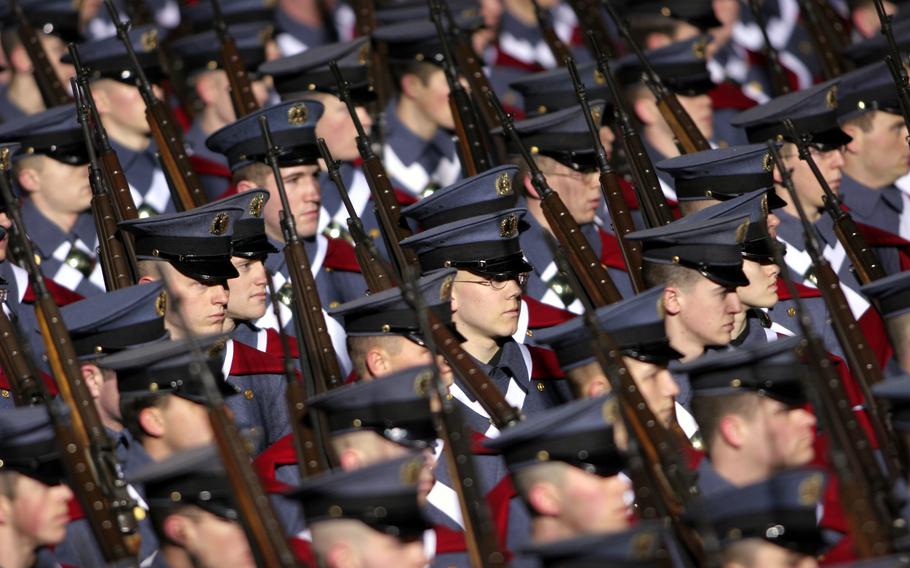
VMI cadets march in the parade for the 2005 inauguration of George W. Bush in Washington. (John McDonnell/Washington Post)
From rat mission to Marine
One by one, the students involved in the waterboarding case have entered the military as officers.
The second Marine lieutenant Robert saw in the Facebook photo is now a platoon commander, according to a Marine spokeswoman. The other VMI graduate who participated in the waterboarding is expected to commission into the Army in 2022, his lawyer said.
The senior who helped initiate the rat mission is a Marine who specializes as an air intelligence officer, a Marine spokesman said.
The Post asked spokespeople for the Marines and the Army whether a college student who has been suspended for having a role in a waterboarding incident would be disqualified from becoming an officer.
Lt. Col. Rob Dolan, a spokesman for the Marine Corps Recruiting Command, said the Marines screen applicants for criminal history. Candidates who have committed “questionable actions” that did not result in criminal charges would have to voluntarily reveal that information to determine whether a waiver is necessary.
The U.S. Army Cadet Command, which oversees the nation’s ROTC programs, said in a statement that when a cadet commits a potentially “disqualifying” act in college, they can face a “disenrollment” board, which reviews evidence and makes a recommendation to a commander. Even if a disqualifying act occurred, the board can still endorse retention.
The cadet planning to commission into the Army nearly lost his chance to become an officer. After he graduated from VMI in May 2020, the U.S. Army Cadet Command initiated disenrollment proceedings against him after learning about the lawsuit in a Post article, said his lawyer, David Sheldon.
Eventually, after a hearing in which the VMI graduate acknowledged his wrongdoing, the Army made its ruling, Sheldon said. He could become an officer.
‘VMI failed him’
By the end of his freshman year, Robert decided he couldn’t remain at VMI. He’d been facing insults on the anonymous social media app Yik Yak. And one of the cadets who’d been in the room when he was waterboarded was elected to one of the most powerful positions on campus for the next academic year: vice president for investigations of the school’s Honor Court.
“[Robert] was terrified,” said his mentor, Andrew Heinlein, now a Navy junior officer based in Georgia. “He was thinking, ‘If I came back to the school the next academic year then there’s a good chance the school might get me through the Honor Court.’ VMI failed him.”
Robert transferred to Virginia Tech, entering its Corps of Cadets.
In his federal lawsuit, he accused VMI, the superintendent and commandant of gender discrimination in violation of Title IX: “willfully [turning] a blind eye to incidents of hazing involving male cadets” while strictly policing abusive behavior toward female cadets.
The college, he argued, created a “discriminatory hostile educational environment” in which the hazing of male cadets is widespread. He also claimed he was sexually assaulted and sexually harassed when he was forced to wrestle shirtless against another male cadet in front of the other students. If two female cadets had been ordered to wrestle naked in the presence of male cadets, he said, VMI would have initiated a Title IX investigation.
Virginia’s office of the attorney general, which represented VMI and its administrators, disputed those claims and filed a motion to dismiss the lawsuit.
In October 2020, federal judge Norman Moon agreed, dismissing the case. Moon said Robert’s examples of hazing incidents did not “rise to the level of a policy or practice that is legally cognizable as discriminatory.” He also said that Robert failed to pinpoint any policy showing VMI condones hazing of male cadets. As for his sexual assault claims, Moon said Robert did not plausibly argue “there was any sexual nature” to the shirtless wrestling.
Robert, though, was not giving up. The next month, in November 2020, he brought a separate lawsuit in state court against the three suspended cadets, plus two others in the room that night, once again accusing them of assault, battery, false imprisonment, civil conspiracy and violating the state’s hazing law. He’s seeking $850,000 in compensatory and punitive damages, as well as legal fees.
The five VMI graduates are fighting the new lawsuit, arguing in court filings that Robert wasn’t waterboarded, wasn’t injured and “consented” to the night’s activities
All five declined interview requests or did not respond to messages left by The Post.
‘He had honor’
In May, it was Robert’s turn to graduate and commission.
Side by side, he and his father, the Air Force colonel, stood on a plaza in the middle of Virginia Tech’s campus, both dressed in their uniforms. Robert’s two younger brothers held flags upright, one an American flag, the other a red Marine banner. The only person missing was Robert’s mom, who died of cancer in 2016, the year before he enrolled at VMI.
“During these last four years, there’s been some tough times,” his father said to dozens of friends and family who had gathered on the plaza. Robert looked down and held his hands together. “When I think about [my son] as the man he’s become. ... Talk about honor. I mean, [he’s] here because he tried to help someone out, and he had honor.”
Then, the father and son stood at attention facing each other, each holding up their right hand as Robert recited his military oath, and declared his rank: second lieutenant in the U.S. Marine Corps.